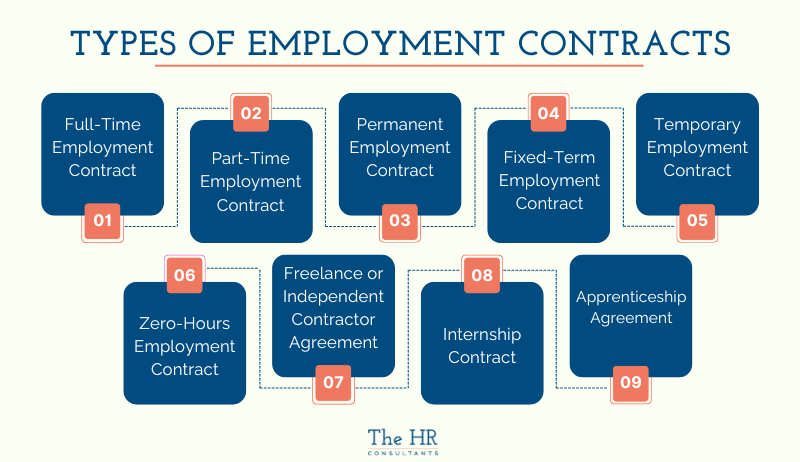"At The HR Consultants, we specialise in helping businesses understand the different types of employment contracts to ensure they make informed, compliant decisions.
From permanent contracts to zero-hours, knowing which type to use can save you from unnecessary complications and create a solid foundation for successful working relationships.
In this guide, we’ll walk you through the nine employment contract types every employer should know.
[addCTA blink=""/services/employment-law-services/"" title=""Ensure your contracts fit your business needs.""]
What is an Employment Contract?
An employment contract is an agreement that lays out the key details of the working relationship between an employer and an employee. It includes things like job responsibilities, pay, working hours, and how long the job will last.
The main point of an employment contract is to keep things clear for both sides—so everyone knows what’s expected and there’s less chance of confusion. It's also legally binding, which helps protect both parties and ensures everything stays above board.
Benefits of Using a Written Employment Contract
An employment contract starts as soon as a job offer is accepted, whether this contract is written or not. However, having a written employment contract provides additional clarity and legal reassurance for both parties. Here are the key benefits:
- Clarity for Both Employer and Employee A written contract clearly outlines job responsibilities, pay, hours, and other key details, ensuring everyone is on the same page right from the start.
- Reduces Disputes and Legal Risks With everything in writing, disputes are less likely to happen and if they do, the contract provides a clear reference point to resolve issues quickly.
- Ensures Compliance with Employment Laws Whilst employment contracts aren't required to be in writing, it is required under the Employment Rights Act 1996 to have a written statement of employment particulars. This includes details like the job title and responsibilities and can be included in the contract of employment.
Related: Employment Law Changes In 2024

Types of Employment Contracts
There are nine types of employment contracts:
1. Full-Time Employment Contract
A full-time employment contract is typically used for roles requiring a commitment of 35–40 hours per week. Employers benefit from having reliable staff who can dedicate their full attention to the business, while employees enjoy the security of regular income and comprehensive benefits.
2. Part-Time Employment Contract
Part-time contracts are similar to full-time contracts but involve fewer working hours, often tailored to the specific needs of the role. For employees, part-time work offers flexibility to balance other commitments, such as studies or childcare. Part-time employees in the UK are entitled to the same rights as full-time workers, including statutory sick pay, holiday pay and pensions, but on a pro-rata basis.
3. Permanent Employment Contract
A permanent employee contract is an agreement with no fixed end date, providing job security for the employee and stability for the employer. Permanent employees benefit from knowing their position is secure, allowing them to plan for the future, while employers can invest in training and development for a stable workforce.
4. Fixed-Term Employment Contract
A fixed-term contract is used for jobs with a specific duration or purpose, such as covering maternity leave or completing a time-sensitive project. These contracts clearly outline the start and end dates, ensuring both parties know the timeframe of the arrangement.
For employers, fixed-term employment contracts provide the flexibility to meet temporary needs without making a long-term commitment. However, employers should manage fixed term contracts carefully to avoid misunderstandings about extensions or early terminations.
5. Temporary Employment Contract
Temporary contracts are short-term agreements, often used to fill in during busy periods or for roles that arise unexpectedly. This type of contract is often managed by an employment agency rather than the employer themselves.
While temporary roles provide flexibility, they can result in higher staff turnover and less continuity within a team. For employees, temporary contracts can be an excellent way to gain experience or earn income during a transitional period.
6. Zero-Hours Employment Contract
Also known as casual employment contracts, these contracts offer flexibility by not guaranteeing a set number of hours. Workers are called in as needed, making this type of agreement particularly useful for businesses with fluctuating demands, such as catering or retail.
For employers, zero-hours contracts provide the freedom to manage staffing levels efficiently, but it’s important to ensure workers’ rights, such as the National Minimum Wage, are respected.
7. Freelance or Independent Contractor Agreement
Freelancers and independent contractors aren’t employees, so instead of an employment contract, they work under a service agreement.
The contract should clearly define the scope of work, deadlines, and payment terms. For businesses, this arrangement provides access to expertise without the commitment of hiring permanent staff. Unlike employees, freelancers typically handle their own taxes and resources.
8. Internship Contract
Internship contracts are designed to provide experience for individuals entering the workforce while giving businesses the opportunity to nurture new talent. A good internship contract should clearly outline the intern’s responsibilities, duration, and whether the role is paid or unpaid, depending on legal requirements. Employers must comply with employment laws, including the National Minimum Wage unless the internship meets specific exemptions.
9. Apprenticeship Agreement
Apprenticeship agreements combine work with formal training, allowing individuals to gain qualifications while earning a salary. Unlike internship wages, apprenticeship wages are lower than the National Minimum Wage, unless the apprentice is 19 or over and has completed the first year of their apprenticeship.
For employees, apprenticeships provide a structured pathway to develop skills and build a career. Apprenticeship agreements also help to address skill shortages and contribute to workforce development in specialised fields.

Differences in Employment Law
When it comes to employing family members, young people, or volunteers, there are some important differences in employment law you need to know. While the basic principles of fairness and compliance still apply, each group comes with its own unique considerations.
Family
Hiring family members might seem like a straightforward option, but it’s important to remember that employment laws still apply. Family members should be treated the same as any other employee. That means offering the same pay, working conditions, and benefits as someone in a comparable role.
Keeping things professional by formalising the arrangement with a written employment contract can help avoid awkward misunderstandings or disputes.
Young People
Employing young people is a great way to offer valuable experience, but there are stricter rules in place to protect their rights and safety.
These include that if they’re under 16, they can’t work more than 40 hours a week. For those still in school, their working hours need to fit around their education, and you might need to get a work permit from your local council.
Volunteers
Volunteers sit outside the usual employment framework, so they don’t have the same rights as employees or workers. While they’re not entitled to pay or benefits, it’s a good idea to have a clear agreement in place that explains their role, responsibilities, and any expenses they can claim back.
This helps avoid confusion and makes sure everyone’s on the same page. Just be careful not to accidentally create an employment relationship by offering payment or imposing strict obligations, as that could open the door to legal complexities.

How to Create and Manage Employment Contracts
We understand that creating and managing employment contracts can be time-consuming and stressful, especially when there’s so much else on your plate.
With over 20 years of experience in providing employment law services, we know exactly how to create contracts that are not only legally watertight but also tailored to your business needs.
What sets us apart is our client-focused approach. We don’t just hand you a standard template; we take the time to understand your business, your goals, and your challenges.
Whether it’s drafting contracts, updating existing ones, or providing ongoing support, we make sure you’re always a step ahead.
Get Started With Employment Law Consultancy
Frequently Asked Questions
We've answered some frequently asked questions on the types of employment contracts below.
How many hours is a permanent full-time contract?
A full-time permanent contract usually involves 35 to 40 hours per week, depending on the role and industry. The exact hours should always be clearly stated in the contract, along with details about benefits like paid holidays and pensions.
Can an employment contract be changed?
Yes, but only with mutual agreement. Changes like pay, hours, or responsibilities need to be discussed and agreed upon by both the employer and employee. Any modifications should be documented to avoid disputes. Legal updates may require changes, but employers must provide notice and communicate clearly.
Do all employees need to have a written contract?
Not necessarily. The employment contact begins when the job is accepted, but employers must provide a written statement of employment terms, which can be given separately to the employment contract, on or before the first working day."














"undefined"